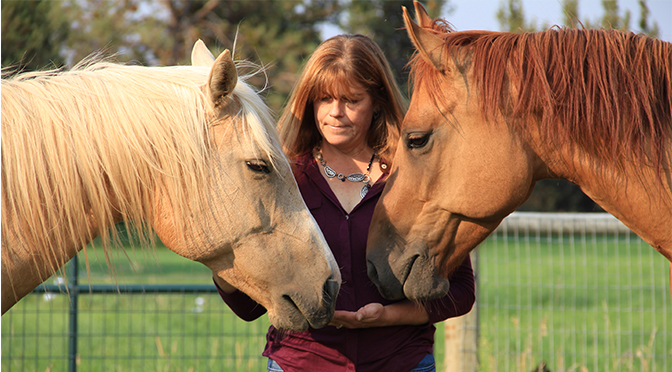(Photo above: Shera with two of the horses at BendHorseTalk| photo provided by Shera Felde)
You may not be a horse person, but there is a global phenomenon that involves what horses can teach us, and what we can learn about ourselves and others in the process. It’s called Equine Facilitated Learning (EFL) and it’s based on a unique approach to professional development, communication and team-building.
“Traditional professional development typically involvesclassroom-style education, presented to an audience that’s expected to absorb and implement key messages,” observed Shera Felde, founder and owner of Bend HorseTalk. “It’s not personal, experience-based learning.”
In order to create a moredirect, experiential learning environment, Felde has combined 40+ years of horse experience with two decades working in education and professional development. “There are a number of reasons horses are good teachers,” she explained. “For one, they give honest, non-judgmental feedback that can be applied to developing our own skills in communication, problem-solving and decision-making. We get to see ourselves as others do when we get their objective feedback.”
Because horses are naturally prey animals, their safety is in their team (the herd), and they have evolved into extremely sensitive creatures. “Most of what humans react to is verbal communication,” Felde continued, but for horses, vocalizing is a very small part of their communication. So part of the EFL approach is watching for the different signals they give: such as where the feet are positioned and movements of the tail, ears and hips, all of which silently convey their messages. How well we partner with them reflects our own relational skills as well as our leadership skills.”
Another key factor in the herd community is trust. Horses are not inherently trustful of others. It’s one of their survival mechanisms. They are constantly evaluating whether outsiders are worthy of their trust and respect. Just as in human interactions, being a good leader in the herd involves effective communication, confidence and sound decision-making. Because we all tend to behave with the horses as we do in our lives with people, we can see where our leadership and relational skills have gaps.
“Some of us have learned to read body language and other subtle cues but horses have an innate, highly-developed ability to see through a facade. Their heightened sensitivity means that they’re able to read not only body language, but personal energy. “One of the things horses look for is congruence,” Felde said. “You can act confident, but if you’re actually fearful or angry, they will respond to that.”
“Horses are all about communication, trust and respect,” said Felde. “And in business settings as well as our personal lives, most problems are either caused or exacerbated by these issues. So when we’re engaged in an activity and the horse isn’t reacting the way we’d like, how do we respond? Even without verbalizations, you can be sure they’re reading it all and sending honest feedback. We just have to learn to recognize it.”
The approach at Bend HorseTalk is one of flexible, individualized coaching, rather than a pre-set agenda. Before any interaction with the horses, workshop attendees are asked to complete a questionnaire, and from these the facilitator identifies key issues, choosing and structuring activities to address the needs and interests of the specific group.
“With business groups, the pre-activity survey gives people a chance to provide anonymous background on their situations and the issues they face at work,” she said. “Business groups face some common problems, but when we examine them from this unique perspective, we often find that the issue boils down to one of trust, teamwork, or communication. Sometimes the communication weakness is what we say to ourselves.”
Workshops generally involve a series of activities, all conducted on the ground. (No riding is involved, and no horse experience is necessary.) After each one, the group comes together to share the experience, discuss what happened and consider how it relates to the group’s workplace. The takeaway is an identified action plan, helping the attendees develop ways to initiate change, facilitate success and improve their effectiveness as a team.
“This type of learning tends to be highly individualized,” Felde added. “Attendees engage in an emotional experience that isn’t often present in traditional classroom settings, and that leads to long-term retention.”
Class size at Bend HorseTalk workshops are generally limited to a maximum of eight, although larger groups can also be accommodated. The typical format is two half-day sessions or one full-day with lunch, and the setting alternates between activities in the arena and discussion as a group. An indoor classroom is available for cold weather.
“This kind of participatory education can be extremely helpful, even once or twice a year, identifying issues deserving further consideration and spotlighting opportunities for personal and professional growth,” Felde concluded. “It’s a very effective learning experience.”
Shera Felde
Shera@BendHorseTalk.com



